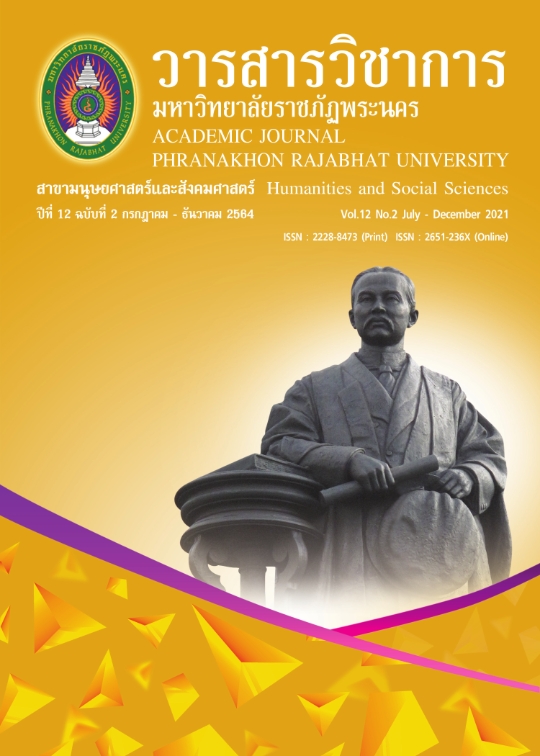THE ENHANCEMENT OF SCIENTIFIC COMPETENCY AND STEM EDUCATION ATTITUDES FOR PRE-SERVICE GENERAL SCIENCE TEACHERS BY USING SCIENCE LEARNING MANAGEMENT MODEL THROUGH STEM EDUCATION
Keywords:
scientific competency, STEM education attitudes, science learning management model through STEM educationAbstract
This research aimed to 1) compare the scientific competency of pre-service general science teachers before and after using science learning management model through STEM education 2) compare the STEM education attitudes of pre-service general science teachers before and after using science learning management model through STEM education. The samples were 30 pre-service general science teachers in the second semester of 2020 academic year from Collage of Teacher Education, Phranakorn Rajabhat University. They were selected by cluster random sampling. The instrument which employed to collect data were: 1) lesson plans using science learning management model through STEM education and 2) tests of STEM education attitudes. Data were analyzed by using average, standard deviation, and t-test dependent. The finding was as follows: 1) The pre-service general science teachers had developed the scientific competency throughout the study. The pre-service general science teachers’ scores were significantly higher than before teaching at the statistical level of .05. 2) The pre-service general science teachers had STEM education attitudes’ scores were significantly higher than before teaching at the statistical level of .05.
References
Chinmueang, W. (2020). Study of Problem Solving Skills and Attitudes toward STEM through Activities on Topic Fun for Plane of Grade 8 Students. The 29th Thaksin University National Academic Conference 2019.
Chulavatnatol, M. (2013). STEM Education in Thailand and the Ambassador of STEM. IPST Magazine. Year 42, Issue 185, November - December 2013 (in Thai)
Dejarnette. (2012).“America’s children: providing early exposure to STEM (science, technology, engineering and math) initiatives”. Education, 133(1), 77-84.
Jindanurak, T. (2017). Education Management 4.0 for sustainable development of the country. Retrieved January 17, 2021 from http://adacstou.wixsite.com. (in Thai)
Laoleandee, W. (2018). Active learning management strategies to improve thinking and enhance educational quality for the 21st century. 12th edition. Petchkasem Printing Group: Nakhon Pathom. (in Thai)
OECD. (2019). PISA 2018 Results (Volume I): What Students Know and Can Do, PISA, OECD Publishing, Paris, Retrieved November 18, 2020, fromhttps://doi.org/10.1787/5f07c754-en
O’Neil, T. L., Yamagata, J. Y. & Togioka, S. (2012). Teaching STEM Means Teacher Learning. Phi Delta Kappan.
Pitiporntapin, S. (2015). Science learning management and society of the 21st century. Bangkok. Boss printing. (in Thai)
Thananuwong, R. (2013). STEM Education Workshop Summary. Retrieved October 4, 2020, from http://slidshare.net/focusphysics/stem-workshop-summary
The Institute for the Promotion of Teaching Science and Technology. (2017).
Focus issues from PISA. Retrieved May 13, 2021, from https://pisathailand.ipst.ac.th/issue-2017-17/. (in Thai)
Wayne, C. (2012). What is S.T.E.M. and why do I need to know?. Retrieved March 15, 2021, from https://issuu.com/carleygroup/docs/ stem12online/1
White, H., & S. Sabarwal (2014). Quasi-experimental Design and Methods, Methodological Briefs: Impact Evaluation 8, UNICEF Office of Research, Florence.
Yuenyong, C. and P. Narjakaew. (2009). Scientific literacy and Thailand science education. International Journal of Environment and Science Education 4(3): 335-349
Downloads
Published
How to Cite
Issue
Section
License
"บทความวิชาการในวารสารฉบับนี้ ถือเป็นความรับผิดชอบของผู้เขียนเท่านั้น"
สงวนลิขสิทธิ์ตามพระราชบัญญัติลิขสิทธิ์




